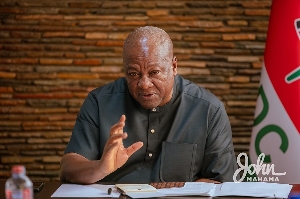Opinions of Sunday, 11 December 2011
Columnist: Lonto-Boy
Has NDC-NPP Politics Fuelled Tribalism In Ghana?
Too often, we settle on politics as the common denominator for fuelling tribalism in Ghana. How we commonly treat this subject has prompted me to raise this issue for national discussion. Ethnicity and tribalism are highly charged words in contemporary Ghana. Ethnicity and tribalism are very subtle and obstructive phenomena. They’re about primordial cultural identities and affections based on common histories, ancestry, cultural values, beliefs, language, and traditions. Sometimes, in an attempt to preserve and promote the cultures and values by one ethnic group, the problem of ethnocentrism/tribalism sets in. Throw in politics, and you’ve a very complex national issue of ‘divide and rule’ approach.
Ethnic rhetoric is potentially effective and highly dangerous at the same time. It accomplishes the following things: It taps into a strong and widespread public sentiment. It offers considerable room for political manoeuvre into gaining votes, and it pretty much works to build strong emotional connection with most voters. It could be used as pure populism of ethnic hegemony. Cunning tribalists and even academics championing their ethnic pride and relevance in national affairs play the ‘tribal-card’ tactics while trying to dominate the rest. It could also be used in connecting to a strongly-felt sense of ethno-regional injustice.
Admittedly, ethnicity and tribal politics is part of the Ghana reality. While this has been true for decades, now the leaders of both NDC and NPP seem to make it worse! Today, Ghana’s politics is in a volatile and pitiable state thanks to the ethno-political shenanigans of both political parties. The irresponsible, confrontational and threatening political rhetoric, the blatant tribal discrimination in civil and public services, the lop-sided ethno-regional based ministerial appointments and allocation of development projects by the NDC government are all elements of naked tribalism. Equally, the NPP is also guilty for the manipulation of tribal loyalties for political and economic ends through identity and sense of marginalisation both in government and opposition. Both political parties have for years failed to do ‘policies’ but rather displayed consistency only in their reckless irresponsibility and unfitness for power. However, when we take politics out of this equation, we end up with intrinsic differences entwined with our different environment; we individually play our part in fuelling tribalism. Some of the contributing factors are our ignorance and thoughtless bigotry. Some people subject others to hatred due to jealousy and envy masked by ‘politics’. Stereotypical, uninformed and the wildly over-entitled attitudes also whip up tribalism. For example, the leadership of, and recruitment of the Ghana Armed Forces shouldn’t be a “Ewe Consortium”, neither should the Presidency of Ghana be perceived an “Akan heritage”. It’s time to challenge this sense of entitlement and mindset in order to push our national welfare without ethnic considerations. So often, we put ourselves in boxes and label ourselves unfairly which contribute to the toxic socio political clouds hanging over Ghana.
Finally, peaceful co-existence between the country’s diverse ethnic groups is a necessary condition for the socio economic and political development of the country. It’s important for all Ghanaians to feel that they can participate effectively and be elected to leadership positions without being subjected to naked tribalism. The country’s media need to be circumspect in reporting. The media should report accurately without being perceived as inflaming volatile situations in the run up to Ghana’s 2012 Elections. Our Government and Opposition need to cast a vision beyond ethnic and regional barriers. We need strong, independent and effective democratic institutions to address the marginalisation and discrimination of ethnic groups/tribes perceived as ‘opposition’ by governments. We also need significant changes in attitudes of our political leaders in both government and opposition for meeting the needs and aspirations of all ethnic groups within our nation. Probably, there’s an urgent need for an apolitical broad-based pressure group to help fight this phenomenon in our politics. May God Bless Our Homeland, Ghana!












